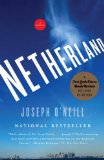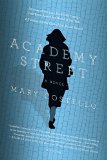Summary | Excerpt | Reading Guide | Reviews | Beyond the book | Read-Alikes | Genres & Themes | Author Bio

A Novel
by Joseph O'NeillNetherland, alas, does not live up to its formidable
promise. I was hooked by this novel right away and was rooting for it throughout
the first third, as it kept holding out the good stuff on me and deferring the
true introduction of the charismatic man at its heart. But it gradually became
clear that this novel wasn't ever going to happen, and I finished it with
disappointment.
Netherland is about the friendship of two very different men. The first
is Hans van der Broek, a straight-laced Dutch banker who marries Rachel, a
British woman, and relocates with her to New York City. After the 9/11 attacks
uproot them from their Tribeca loft and deposit them in the famed and eccentric
Chelsea Hotel, their marriage begins to fall apart. When his wife takes their
son back to London, Hans finds himself adrift in the city and removed from his
own feelings. A chance conversation with a taxi driver leads him to join a
regular cricket match on Staten Island, and there he encounters Chuck Ramkissoon.
Chuck's identity is improbable and slippery. He is a West Indian with gravity
and authority, but his authority is sourceless, self-generated. He presides from
a nondescript office in the garment district, backed by a grouchy rich man whom
he must constantly humor, and his business is nothing so much as being on the
make. Hans describes him in these terms:
He found the ordinary run of dealings between people boring and insufficiently advantageous to him at the deep level of strategy at which he liked to operate. He believed in owning the impetus of a situation, in keeping the other guy off balance, in proceeding by way of sidesteps. If he saw an opportunity to act with suddenness or take you by surprise or push you into the dark, he'd take it, almost as a matter of principle. He was a willful, clandestine man who followed his own instincts and analyses and would rarely be influenced by advice—not my advice, that's for sure.
His grand vision is to create the New York Cricket Club, a first-class
cricket stadium in Queens. "Global TV rights. A game between India and Pakistan
in New York City? In a state-of-the-art arena with Liberty Tower in the
background? Can you imagine the panning shots?" Chuck tells Hans, "we're
thinking a TV viewership of seventy million in India alone. Seventy million. Do
you have any idea of the sponsorship deals this would attract?" Almost
without his consent, he folds Hans into the scheme. Hans soon finds himself
mowing the future cricket green and driving Chuck around the city on enigmatic
business errands, all in a quest to decipher his new friend. Is he a con artist,
a delusional, a visionary?
Chuck is the mystery around which this novel circles, but it almost feels as
if the author doesn't realize that, because he devotes most of the novel to
Hans. This is a huge tactical mistake, because Hans is a cipher, a man absent to
himself and who should therefore properly be the vehicle through whom we come to
understand the alternately entertaining and threatening Chuck. Instead, we are
treated to long passages in which Hans recollects his boyhood in The Hague and
the opening years of his relationship with Rachel. These recollections are meant
to pervade the novel with a powerful sense of nostalgia even as Hans builds a
new life for himself, but instead they simply feel like lengthy—and ultimately
fatal—diversions from the real story of Chuck. O'Neill writes searingly well
about the silences that begin to accumulate in a dying marriage. But Hans
remains placid and unresponsive through most of the story—in fact, this is one
of the reasons why Rachel leaves him. As she announces her intentions to move
back to London, he describes himself as "sitting on the floor, my shoes stupidly
pointing at the ceiling".
It doesn't help that O'Neill, himself an Irishman raised in Holland, uses an
idiosyncratic English that itself gets in the way of total immersion in his
world ("I was not much extracted from the innocence in which the benevolent but
fraudulent world conspires to place us as children").
Netherland is best when it introduces its kaleidoscopic and near-infinite
cast of background characters—the colorful denizens of the Chelsea Hotel, the
international team of cricketers on Staten Island, the marginal figures with
whom Chuck socializes and does shady business. But none of these characters
stick around for long, as Hans keeps taking up the story in his plodding and
uninflected voice, and even Chuck's story gets buried in the far less engaging
story of Hans' reunion with Rachel. I rooted hard for this book, but in the end
it let me down.
![]() This review was originally published in The BookBrowse Review in June 2008, and has been updated for the
June 2009 edition.
Click here to go to this issue.
This review was originally published in The BookBrowse Review in June 2008, and has been updated for the
June 2009 edition.
Click here to go to this issue.

If you liked Netherland, try these:

by Tyler Anbinder
Published 2017
A defining American story, never before told with such breadth of scope, lavish research, and resounding spirit.

by Mary Costello
Published 2016
A vibrant, intimate, hypnotic portrait of one woman's life, from an important new writer.




A truly good book teaches me better than to read it...
Click Here to find out who said this, as well as discovering other famous literary quotes!
Your guide toexceptional books
BookBrowse seeks out and recommends the best in contemporary fiction and nonfiction—books that not only engage and entertain but also deepen our understanding of ourselves and the world around us.